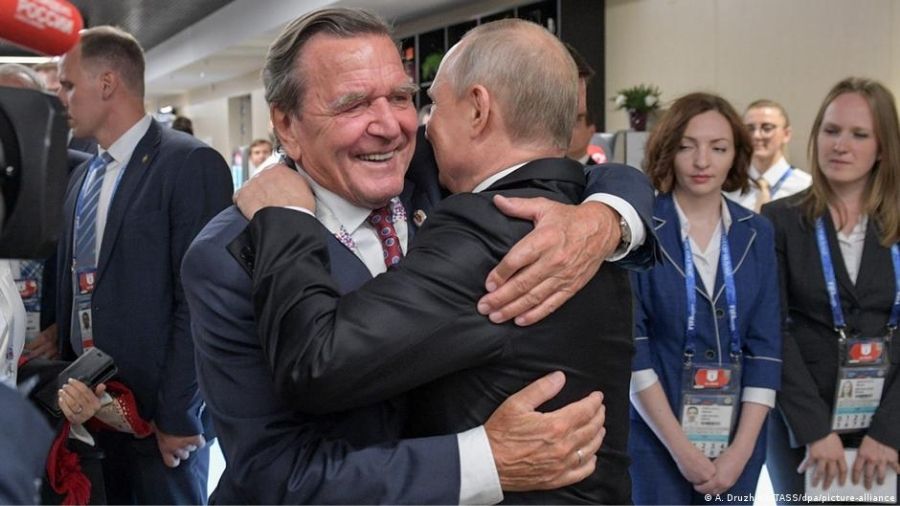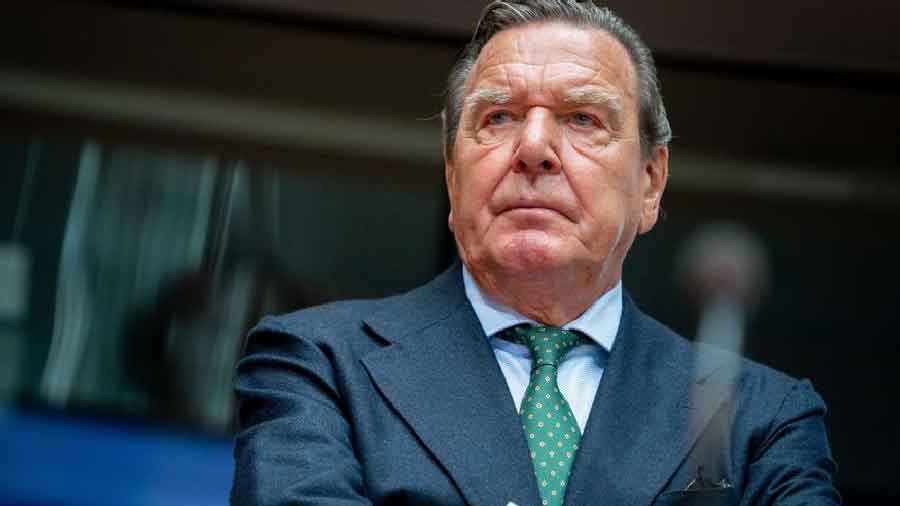The former chancellor has come under heavy criticism for refusing to distance himself from Russia and Vladimir Putin. Now the German government is planning to take away his office and staff, without touching his pension.
Germany's coalition government is prepared to move forward on a plan to strip formerSocial Democrat Chancellor Gerhard Schröder of his post-office privileges, as his business and political ties to Russia continue to draw controversy.
The proposal to remove Schröder's privileges was presented as part of a draft budget proposal that was being discussed in the Bundestag's budgetary committee on Thursday. This is only the first of several steps before the proposal could become law.
When a German chancellor steps down, it is customary for them to receive a state-funded office and staff to continue political work, along with a pension.
Since Russia's invasion of Ukraine, Schröder's critics say he has not done enough to distance himself from his Russian business ties and President Vladimir Putin, whom Schröder still calls a close personal friend.
German Finance Minister Christian Lindner told Germany's Welt TV that it was unthinkable that a former chancellor who is now "openly doing lobby work for the criminal rule of Vladimir Putin is still given an office by taxpayers."
What will Schröder lose?
Under the proposal, Schröder would be stripped of his office and staff, which cost €407,000 (roughly $425,000) in taxpayer funds last year and had been more than half a million euros a year as recently as 2017.
But the proposal stops short of demands from opposition Conservatives that the former chancellor also lose his pension, which equates to an annual salary in the region of €100,000 (roughly $105,000). Some even questioned whether this step would be legally possible under broader German pension law.
A new general rule? Or specific to Schröder and Russia?
And although German politicians have been outspoken in criticizing Schröder's Russia ties, these were not explicitly stated in the proposal as reasons for stripping his privileges.
The proposal argues that the "endowment for former federal chancellors should in the future no longer be status-related, but should be based on the continuing the obligations arising from their office."
"The budgetary committee observes that former Chancellor Schröder no longer carries out any duties that result from his former office," the parties' joint motion read, calling for the office to be closed.
Four staff at Schröder's office have already asked for new assignments, in protest at his position on the war in Ukraine, and the motion said any remaining staff would now be responsible for closing up shop.
The release of the plan, which had been widely reported domestically earlier in the week, prompted newspapers to question whether its stated reason was accurate.
An editorial published in the Augsburger Allgemeine newspaper said that, should the issue really be a former chancellor no longer being politically active, "then not only Schröder has a problem, but also his successor." Former Chancellor Angela Merkel's staff is "significantly larger and almost twice as expensive" as Schröder's, but she has "not yet taken on any major missions in the service of the country. So why does she need nine employees?" the newspaper asked. Merkel has indicated that she at least plans a break from front line politics, even leaving open the possibility of not returning in an active capacity at all, so far only announcing plans for a memoir.
European Parliament seeks sanctions on Schröder
On Thursday, the European Parliament will vote on whether Schröder should be included in a new sanctions list in response to Russia's war targeting "European members of the boards of major Russian companies and politicians who continue to receive Russian funds."
A draft of the text said that Schröder had been "strongly encouraged" to give up his posts at large Russian companies.
Although the motion likely enjoys support in the European Parliament, it is not binding, as sanctions against Russia are approved at the level of EU member states.
Schröder was the last SPD leader of Germany before current Chancellor Olaf Scholz.
Since the war in Ukraine, SPD leadership has asked him to leave the party, and is currently at risk of descending into debate on whether to try to expel him now the deadline set for his departure has passed.
As chancellor from 1998 to 2005, Schröder worked to build Germany's economic ties with Russia via the "change through trade" policy.
Since leaving office, he has worked for Russian state energy firm Rosneft and the Nord Stream projects. He has also been nominated for the supervisory board of the Russian gas giant Gazprom.
Schröder has always maintained that his ties with Putin are a valuable channel of communication with the leader of Russia. However, a visit in March to Moscow failed to change Putin's course of action in Ukraine. He has since offered to try to use his contacts to broker some form of negotiations once more











